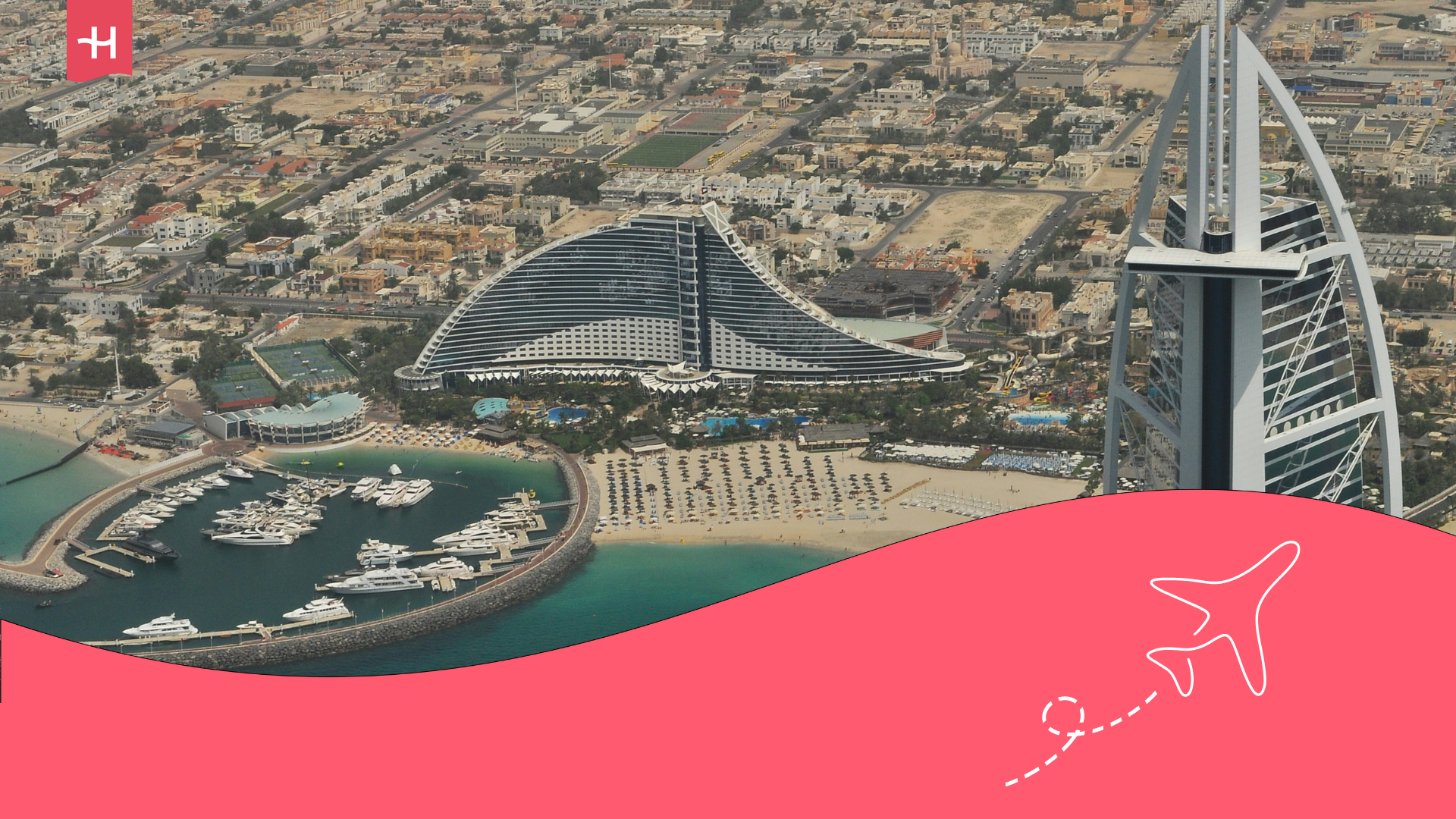Best supermarkets in Rome: Where to go grocery shopping?
Discover the best supermarkets and stores in Rome so you can make the most of your budget in the “Eternal City.”
Moving to Rome isn’t just about finding an apartment and learning your way around the city. It also means getting your everyday life in order. And for that, knowing the best supermarkets in Rome is essential, since food and groceries are as basic and important as it gets.
Food in the “Eternal City” is an experience all on its own, but eating out all the time can quickly drain your budget. That’s why being able to cook at home makes such a difference. Knowing where to pick up everyday staples, which supermarket chains offer better prices, and where to find special ingredients will save you money, time, and plenty of stress.
Rome has it all, from big international chains to neighborhood markets where you’ll still find a friendly atmosphere and fresh seasonal produce. Getting to know these options early on will make settling in much easier and let you enjoy the Roman experience with everything you need close at hand.
What kind of shops can we find in the Italian capital?
While Italy isn’t among the priciest countries in Europe, life in the capital definitely comes with a higher price tag. After all, it’s a city that draws millions of visitors every year.
Luckily, Rome offers plenty of options for your daily shopping that can help you save money. It is not just about the big chains, since depending on the neighborhood you might come across small family-run shops as well as large supermarkets. Understanding these differences is key to managing both your budget and your routine.
Alimentari: Classic neighborhood shops
Alimentari are small family-run shops that are a staple of daily life in Rome. You can find fresh bread, cold cuts, cheeses, pasta, wine, and other everyday essentials. The best part is how convenient they are since they are usually found throughout neighborhoods just a short walk from home. Many also offer personalized service and high quality local products.
Supermercati: Medium-sized chains
Supermercati are the equivalent of traditional supermarkets. They offer a wide range of products including fresh food, cleaning supplies, drinks, and everyday essentials. They are found all over the city and are perfect for weekly shopping. Some of the most well-known ones include Conad, Coop, and Carrefour Express.
Ipermercati: Large purchases in the suburbs
In the outskirts of Rome or at large shopping centers you will find ipermercati, very large supermarkets where you can buy almost anything, from food to appliances or clothing. They are ideal for people who do big monthly shops or want lower prices on non-perishable items. A popular example is Ipercoop.
Open-air markets: Freshness and tradition
Open-air markets may not be supermarkets, but they are an essential part of life in Rome. Spots like Campo de’ Fiori and Testaccio are great for fresh fruits, vegetables, fish, and meat. You can also discover gourmet treats and Italian specialties. They are the perfect choice if you want fresh produce and a truly authentic Roman experience.
Important: If you are a frequent traveler and want to stay connected without worrying about expensive roaming or looking for a new SIM at every destination, Holafly’s subscription plans are for you. With a single eSIM, enjoy internet in more than 170 countries for a fixed price and no surprises on your bill. Travel without limits and connect easily and securely! 🚀🌍

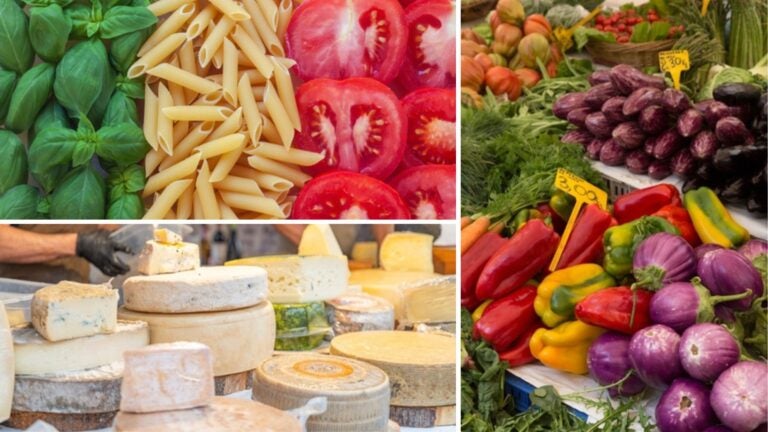
What are the five best supermarkets in Rome?
Shopping at a supermarket in Rome comes with several advantages. They have longer opening hours than small shops, competitive prices, and a wider selection of products, from everyday essentials to imported goods. For anyone who has just moved to the city, supermarkets quickly become valuable allies for keeping daily life simple and organized.
Rome’s major supermarkets are strategically located throughout the city:
- In residential neighborhoods such as Monteverde, Prati, and San Giovanni, medium-sized chains predominate, which are very convenient for weekly shopping.
- In more central areas such as Trastevere, Termini, or near the Vatican, you will find smaller (express) versions adapted to urban life.
- On the outskirts of the city or in shopping centers, there are ipermercati, perfect for those who prefer to do a big monthly shop.
In this guide, we’ll show you the five top-recommended supermarkets in Rome, highlighting their main features and why they’re worth choosing.
1- Coop, one of Rome’s leading supermarkets
Coop is one of Italy’s largest consumer cooperatives, with a nationwide presence and decades of experience in retail. In Rome, you can find branches in neighborhoods like San Giovanni, Prati, and Monteverde, as well as hypermarkets in suburban shopping centers.
At Coop, you’ll find everything you need for daily life: fresh fruits and vegetables, meat, fish, cheese, fresh pasta, wine, and cleaning products. The store is also known for its own brand, ‘Coop,’ which is praised for its great value. For those looking for healthier options, there’s a wide selection of organic and fair-trade products.
Compared to other chains in Rome, Coop maintains affordable prices, although slightly higher than Lidl or Eurospin. For example:
- A bottle of local wine (750 ml): $4.10
- 1 litre of fresh milk: $1.65
- 1 kg of Coop brand pasta: $1.30
- Fresh tomatoes: $2.60 per kg
Most Coop stores in Rome are open from 8:00 am to 9:00 pm, though smaller supermarkets may close earlier. Hypermarkets in shopping centers usually stay open until 10:00 pm.
Advantages and disadvantages of Coop
| Advantages | Disadvantages |
| Wide variety of fresh and local products | Prices slightly higher than low-cost chains |
| Own brand with good value for money | Not all branches are large, some have limited assortment |
| Strong presence in Rome and throughout Italy | Long lines during peak hours |
| Commitment to sustainability and organic products | Less aggressive promotions than other supermarkets |
2- Conad, a very popular supermarket chain in Rome
Conad is one of Italy’s largest supermarket chains, with over 3,000 locations nationwide and a strong presence in Rome. Medium-sized stores can be found in almost every neighborhood, while larger locations are usually in commercial areas.
Conad offers everything from fresh produce, including fruits, vegetables, meat and fish, to cleaning and personal care products. It also features several private brands, such as Sapori & Dintorni Conad, which focuses on gourmet and traditional Italian products, and Verso Natura Conad, which offers organic and healthy foods.
Conad’s prices are on average slightly lower than Coop’s and quite similar to Carrefour’s. For example:
- 250g of Lavazza coffee: $4.60
- 1 litre of Conad extra virgin olive oil: $6.10
- 1 kg of apples: $2.30
- 500g of Barilla pasta: $1.45
Conad supermarkets are usually open from 8 am to 9 pm, with some express locations staying open later. On Sundays, many stores operate only in the morning, from 8 am to 1 pm.
Advantages and disadvantages of Conad
| Advantages | Disadvantages |
| Wide coverage in Rome, there is always a Conad nearby | Prices are not always as low as Lidl or Eurospin |
| Good balance between own brands and quality products | Some small stores have narrow aisles and less variety |
| Affordable gourmet and organic options | Reduced hours on Sundays at most locations |
| Strong Italian identity in its own brands | Promotions do not always apply at all locations |
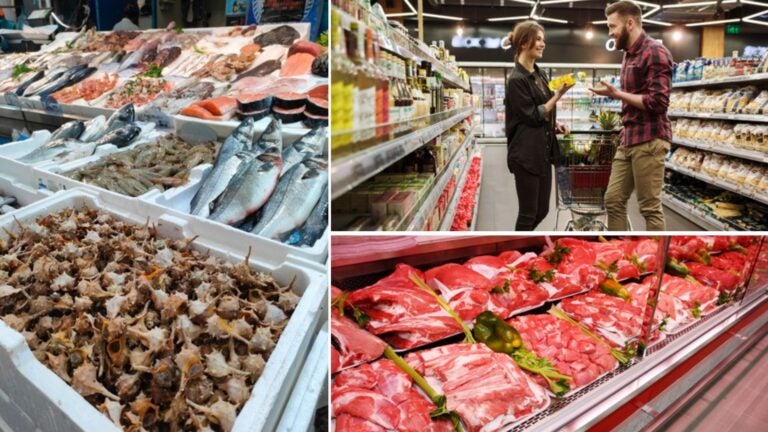
3- Carrefour, a multinational chain in Rome
Carrefour is a French multinational with a strong presence in Italy. Its main advantage is the variety of store formats, ranging from hypermarkets in shopping centers to medium-sized supermarkets and express stores designed for quick shopping.
Carrefour Express stores are common in Rome, especially in central areas like Termini, Trastevere, and Prati. Hypermarkets, on the other hand, are mostly located in the outskirts and shopping centers.
The chain offers a wide range of products, including fresh food, gourmet items, international brands, cleaning supplies, and even appliances in its hypermarkets. It also has private brands such as Carrefour Bio, which features a full line of organic and healthy products.
Carrefour isn’t the cheapest option, but it stands out for its frequent promotions and the chance to find international brands that are hard to get at other chains. Here are a few examples:
- Chianti DOCG wine (750 ml bottle): $5.30
- A loaf of fresh bread: $1.40
- 1 litre of Carrefour milk: $1.35
1 kg of fresh chicken: $7.10
Carrefour is one of the chains with the most flexible hours. Many Express stores are open from 7 am to 11 pm, and some even operate 24 hours. Hypermarkets usually open from 8 am to 10 pm.
Advantages and disadvantages of Carrefour
| Advantages | Disadvantages |
| Extensive network of stores in Rome, including 24-hour stores | Higher prices compared to Lidl or Eurospin |
| Offers international and gourmet products | Express stores are small and have a limited selection |
| Frequent promotions and loyalty programs | During peak hours, downtown locations tend to be very crowded |
| Wide variety of formats (Express, Market, Hyper). | Not as prevalent in some outlying neighborhoods |
4- Supermarkets in Rome: Lidl
Lidl is one of the most well-known German supermarket chains in Europe. In recent years, it has expanded widely across Italy, establishing itself as a low-cost option without compromising on quality. Its motto focuses on offering low prices, private-brand products, and very attractive weekly promotions.
In Rome, it has several locations in residential neighborhoods and on the outskirts, though you won’t find as many in the historic center as you do with Carrefour Express.
Lidl may not have as wide a selection as Coop or Carrefour, but it covers all the basics, from fresh produce and meat to bakery goods and household and personal care items. Highlights include its fresh-baked bread and the Deluxe line, which offers gourmet products at reasonable prices. The store also features international foods during special weekly themes, like Spanish Week or Greek Week.
In terms of prices, Lidl is one of the cheapest supermarkets in Rome:
- 1 kg of oranges: $2
- 1 freshly baked baguette: $1.50
- 1 liter of fresh milk: $1.50
- 500 g of pasta: $1.20
Lidl stores are usually open from 8:00 am to 9:00 pm, although in some neighborhoods they close at 8:30 pm. On Sundays, most branches are only open for half a day.
Advantages and disadvantages of Lidl
| Advantages | Disadvantages |
| Very competitive prices | Less variety of international brands |
| In-house bakery with freshly baked goods | Fewer stores in Rome’s historic center |
| Weekly themed promotions | Smaller stores than other chain hypermarkets |
| Good quality basic products and own brand | More limited opening hours compared to Carrefour |
5- Eurospin, another alternative for Rome
Eurospin is an Italian discount supermarket chain that focuses on keeping prices low through its strong emphasis on private-brand products. It has become a popular choice for shoppers looking to save money without compromising on quality.
It has over 1,200 stores across Italy, making it one of the fastest-growing discount chains. In Rome, you’ll find locations in residential and suburban neighborhoods such as Casilina, Tiburtina, and Aurelia.
Eurospin’s selection covers the essentials, including fruits, vegetables, meat, cheese, bakery items, canned goods, drinks, and cleaning products. Its private brands, such as Tre Mulini for pasta and bread, Pascoli Italiani for dairy and meat, and Delizie del Sole for typical Italian products, are well recognized by shoppers. The stores also carry household items, small appliances, and seasonal products.
Eurospin, along with Lidl, is one of the cheapest chains in Rome. Here are some examples that reflect this:
- Bottle of table wine: $3
- 1 liter of Pascoli Italiani milk: $1.50
- 1 kg of Tre Mulini pasta: $1
- Fresh tomatoes per 1 kg: $2
Eurospin supermarkets are usually open from 8:00 am to 8:30 pm, with some stores staying open until 9:00 pm. On Sundays, they generally work half a day, until 1:00 pm.
Advantages and disadvantages of Eurospin
| Advantages | Disadvantages |
| Lowest prices on the market | Less presence in Rome’s historic center |
| Wide range of Italian brands | Less variety of imported products |
| Ideal for large, low-cost purchases | Less modern stores than Coop or Carrefour |
| Very good value for money on fresh produce | Fewer gourmet or organic options |
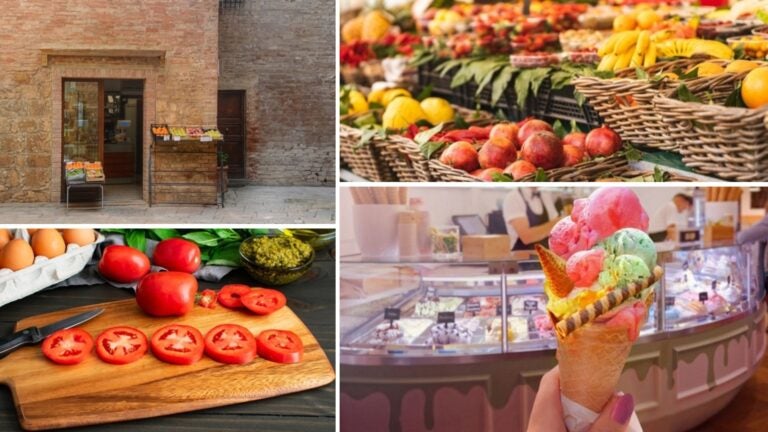
Other notable shops and stores in Rome
Beyond supermarkets, Rome has a wide range of shops and stores where you can take care of other everyday needs. Whether you’re buying an appliance, updating your wardrobe, or looking for home décor, these options are especially useful for newcomers seeking practical solutions at good prices.
The following are some of the most popular shops in Rome.
1- MediaWorld: Technology and appliances
MediaWorld is Italy’s leading chain for tech products and appliances. You can find everything from refrigerators and washing machines to 4K TVs, gaming consoles, laptops, and small accessories like headphones or coffee makers. The chain is also known for offering significant discounts both in-store and online, along with financing options.
In Rome, you’ll find large MediaWorld stores in shopping centers like Porta di Roma and Cinecittà Due, featuring spacious showrooms where you can try out products before buying.
2- Coin: Fashion and home goods in one place
Coin is a classic Italian department store, in areas such as Termini and San Giovanni, offering international clothing brands, high-end cosmetics, and home decor accessories.
It’s a great option if you’re looking for a place where you can shop for both fashion and home goods at the same time. Plus, they offer seasonal sales on quality, well-designed items.
3- OVS: Affordable clothing for the entire family
OVS is Italy’s answer to chains like H&M and Zara. These are affordable fashion stores offering collections for women, men, kids, and teens. Their strength lies in delivering good value, with both wardrobe essentials and seasonal trends at reasonable prices.
OVS has stores both in central spots like Via del Corso and in residential areas, so it’s easy to shop no matter where you are in Rome. It’s a handy option for newcomers who want to update their wardrobe.
4- IKEA: Low-cost furniture and home goods
Moving to Rome with an almost empty apartment? IKEA usually saves the day. Popular with newcomers, this Swedish chain makes it easy to furnish your home on a budget, offering everything from beds and sofas to kitchen gadgets, textiles, and lighting.
One big advantage is the flexibility. You can choose simple, budget-friendly items or spend a little more on pieces that last longer, all without breaking the bank. IKEA in Rome, with large stores at Porta di Roma and Anagnina, also offers home delivery and assembly, which is very convenient if you don’t have a car or want to avoid the hassle.
It also has its well-known restaurant, where you can enjoy Swedish dishes like meatballs at very reasonable prices after a long day of shopping.
5- Flying Tiger Copenhagen: Fun gifts and decorations
If you’re looking to add a personal touch to your home or find practical, quirky items without spending a lot, Flying Tiger is the place to go. This Danish chain of modern variety stores has several locations in central Rome, near Piazza Venezia, Via Nazionale, and Trastevere, making it a convenient stop for people who live or work in those areas.
You’ll find just about everything, from kitchen accessories and office supplies to colorful stationery, toys, electronic gadgets, and unique decorative pieces. The best part is that prices are very low, with many items costing between $3-6. The selection also changes with the seasons, so you’ll often come across special collections for Christmas, Easter, or summer.
For those who have just moved, it is the perfect place to buy those little details that transform an apartment into a home.
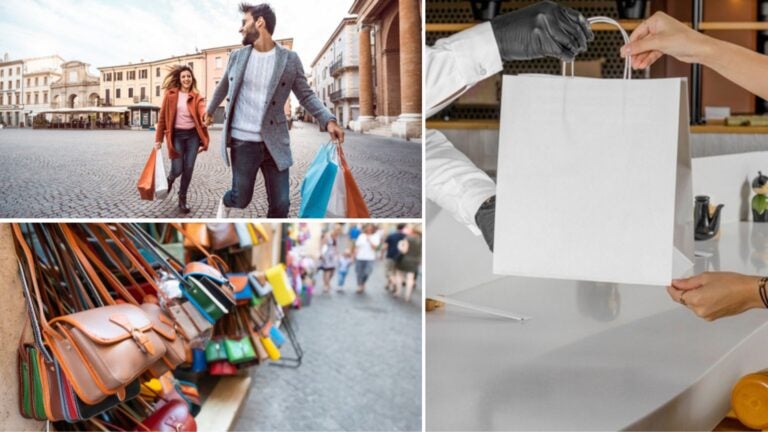
A tip for shopping in supermarkets in Rome
Shopping in Italy’s capital is easier if you mix and match the options available. Use supermarkets for your everyday essentials and take advantage of local markets for fresh seasonal fruits, vegetables, and other products.
For furniture and home décor, IKEA and Flying Tiger are practical and budget-friendly choices. Keep in mind that each neighborhood has its own pace: downtown, small express-style shops dominate, while in the outskirts you’ll find large supermarkets for bigger shopping trips
Frequently asked questions about supermarkets in Rome
Lidl and Eurospin are generally the most budget-friendly chains. They tend to have lower prices on staples like pasta, milk, and bread, while Coop and Carrefour offer a wider selection.
Yes, though their hours are limited. Express stores like Carrefour Express often stay open later, while places like Lidl or Eurospin usually close around early afternoon.
Yes, especially at Carrefour and large supermarkets like Coop. You can often find imported products there, from Asian sauces to American cereals. There are also specialty stores in multicultural neighborhoods.
It depends on what you’re looking for. Local markets offer top-quality fresh fruits, vegetables, meats, and fish, though prices can be a bit higher. Supermarkets are better for packaged goods, cleaning supplies, and bigger shopping trips.
Almost everywhere accepts debit and credit cards as well as contactless payments. In local markets and small neighborhood shops, cash is still often preferred, so it’s a good idea to carry some with you.





 Language
Language 


















 No results found
No results found



